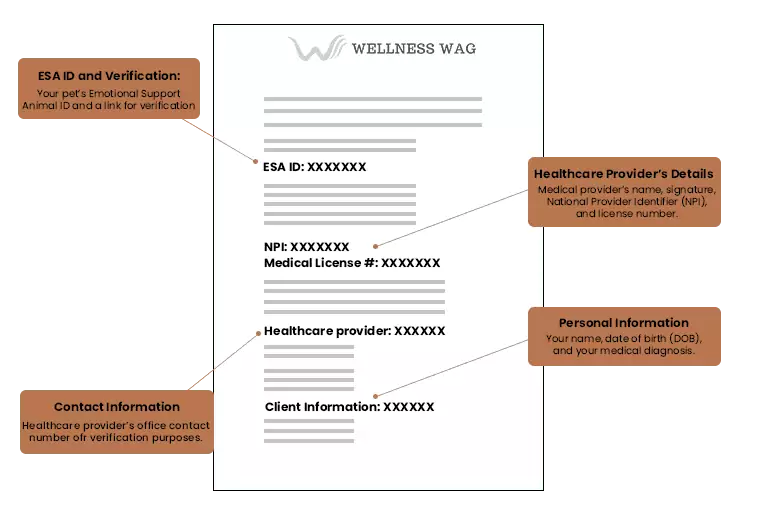Experience Our Quick and Easy Process
Experience Our Quick and Easy Process


Discover Your ESA Eligibility
Start Your Emotional Support Animal (ESA) registration by answering brief questions about your ESA requirements.

Consult with an experienced doctor
Consult a licensed medical professional for expert guidance and care.

Obtain your official esa letter
Get approved and receive your emotional support animal letter within 24 hours.
Your ESA Letter Contains the Following:
Money back Guarantee

If Your Delaware ESA Letter is not approved, we will refund 100% of your payment.

See what our happy Pet parents have to say…
Meet Some of Our Compassionate Care Team

Dr. Chance Miller, MD
Dr. J. Chance Miller, a native of Alabama, earned his B.A. in Spanish with minors in Biology and Chemistry from the University of Alabama at Birmingham. He was the captain of his rugby team during his time there. Dr. Miller obtained his medical degree from Columbia University College of Physicians and Surgeons in New York City, and completed his internship and at Washington University in Saint Louis.

Dr. Tasha Kornegay
Dr. Tasha Holland-Kornegay is a Licensed Professional Counselor and pet expert. She began her journey as an Animal Assisted Therapist to help her patients manage tricky, chronic mental health concerns like anxiety and depression using animals. Her expertise extends beyond traditional therapy, as she incorporates a holistic approach that considers the unique bond between humans and animals.

Dr. Stephanie White
I’m Dr. Stephanie White, a Licensed Clinical Social Worker with advanced training in counseling since 2002. Offering Teletherapy, I guide you through challenges with evidence-based care. Licensed in multiple states, including CA, NV, AK, HI, FL, and TX, I aim to promote self-sufficiency and transform lives through growth. Start your journey to better mental health today!

Dr. Joel Durinka, M.D.
Dr. Joel B Durinka, MD, a renowned Family Medicine physician in Buffalo, NY, provides personalized healthcare. With extensive medical training, he ensures tailored care, prioritizing trust and open communication. Patients receive comprehensive care, and Dr. Durinka stays updated with medical advancements. He acknowledges the benefits of emotional support animals for patient well-being.
ESA Letter Walkthrough: Your Visual Guide to Comfort and Connection
About Emotional Support Animals In Delaware


What is an emotional support animal in Delaware?
An emotional support animal (ESA) in Delaware is a companion animal that provides comfort, emotional support, and alleviates symptoms related to mental health disorders for individuals with qualifying conditions. Unlike service dogs, ESAs do not require specialized training to perform specific tasks.
Are emotional support animals considered service dogs in Delaware?
No, emotional support animals in Delaware are not categorized as service animals. Service animals are specially trained to perform specific tasks for individuals with disabilities, while ESAs primarily offer emotional comfort to individuals with mental health disorders.
What is the difference between an emotional support animal and a service animal in Delaware?
The key difference lies in their training and the type of assistance they provide. ESAs offer emotional support to individuals with mental health conditions without requiring specialized training. On the other hand, service animals undergo rigorous training to perform tasks directly related to their owner’s disability.

Discover Wellness Wag
We at Wellness Wag, comprise a team of devoted professionals who believe in enhancing lives through the healing power of emotional support animals. With our extensive experience in the sector, we’ve aided countless individuals in finding tranquility, comfort, and a revitalised sense of well-being through the companionship of an Emotional Support Animal.
Our objective at Wellness Wag is to ensure reliable and accessible Emotional Support Animal Letters consultations. This provides individuals battling emotional and mental health issues the chance to witness the life-changing impact of an ESA’s companionship. We are committed to equipping our clients with the knowledge and resources to navigate this process with confidence and empathy.
Discover The Effortless Way To Get Your Legitimate ESA Letter With Wellness Wag

Complete Our Assessment
Take our quick assessment to tell us about your situation and emotional support needs, so we can tailor our services to your emotional support animal in Delaware.

Consult With Medical Physicians
After you submit the required forms, we’ll link you with a licensed medical professional in Delaware for a personalized consultation and thorough evaluation to assess your eligibility for an ESA.

Receive Your ESA Letter
Upon confirmation by our team, you’ll receive a professionally crafted ESA letter with legal recognition within 24 hours of your consultation.
Wellness Wag offers a Money Back Guarantee to ensure a stress-free experience with your pet.
If, for any reason, your legitimate ESA letter doesn’t work, we will refund your money in full.
Whether it’s because of non-qualification or illegal denial by your landlord, we’ve got you covered.
Our policy guarantees a 100% refund for two reasons:
Embrace the transformative benefits of emotional support animals with ease.
Choose Wellness Wag for a smooth process guided by our trusted team of medical physicians.
Enjoy the positive impact of the ESA experience for you and your furry companions.



















